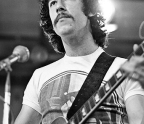
Standing before an open window on the twenty-fourth floor of New York City’s former Navarro Hotel, Pete Townshend fell into the throes of what he calls “a classic, extreme, psychotic New York anxiety attack”. It was March 1971, and The Who had come to the city on the recommendation of their manager, Kit Lambert, in a last-ditch effort to record a musical project that had been plaguing the guitarist. Lifehouse, as he called it, was the concept album that would surpass 1969’s Tommy, The Who’s groundbreaking rock opera.
Since 1966, Townshend had been developing the format, first with his nine-minute mini-opera A Quick One, While He’s Away, and then with the musical suite Rael on 1967’s The Who Sell Out, an album of songs presented as an afterthought, in the guise of a pirate radio station broadcast.
But it was with Tommy that he pulled the essential pieces together: a dramatic story arc and a set of musically ambitious tunes that didn’t neglect the commercial song format. With its plot about an enigmatic deaf, dumb and blind boy, and including the radio hits See Me, Feel Me and Pinball Wizard, Tommy was the artistic breakthrough that took The Who to the heights of both critical respect and pop stardom. Before it, no one in The Who – not Townshend, singer Roger Daltrey, bassist John Entwistle or drummer Keith Moon – thought the band had the legs to endure a long future. Tommy changed everything. The Who seemed poised to define rock’n’roll for the brand new decade. And they would start with Lifehouse, Townshend’s latest rock opera.
There was just one problem: no one could understand the new project’s science-fictioninspired plot or the message at its heart. Manager Kit Lambert was Townshend’s longtime creative support and ‘interpreter’, the one person who might have been able to help him sort out the project’s complexities. But a dejected Lambert had departed London for New York City in 1970 after Townshend rejected his script for a film about Tommy. Longing for a rapprochement with the one person who could help him, Townshend had eagerly accepted Lambert’s invitation to record in New York City. But their reunion was anything but warm.
The grandiose plans for Lifehouse were falling apart, and taking Townshend with them. Sitting with the rest of the band in the manager’s hotel room, his anxiety reached its peak.
“I got






